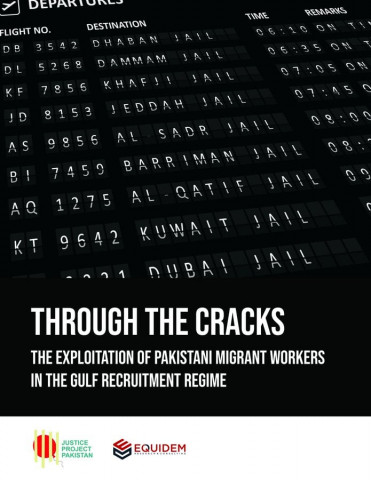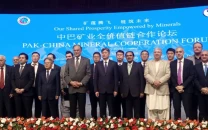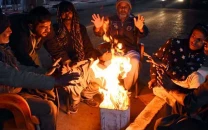11,000 Pakistanis jailed abroad: report
1.5m Pakistanis left country seeking work in last three years

JPP report on exploitation of Pakistani migrant workers
The report, titled "Through the Cracks: The Exploitation of Pakistani Migrant Workers in the Gulf Recruitment Regime", has been prepared by Justice Project Pakistan, a non-governmental organisation.
JPP's report "Through the Cracks: The Exploitation of Pakistani Migrant Workers in the Gulf Recruitment Regime" is out.
— Justice Project Pakistan (@JusticeProject_) April 23, 2019
Link to the report: https://t.co/YK0Du6a2mA pic.twitter.com/TrOmvDo1Jp
It is based on interviews of families of Pakistanis imprisoned in Saudi Arabia on drug-related charges, former detainees, and individuals representing overseas employment promoters.
The report reveals that over 1.5 million Pakistanis have left the country seeking work in the last three years, joining an estimated 10 million diaspora.
The benefits for Pakistan include one of the highest levels of remittances in the world.
However, the regulation of labour migration remains weak, promoting human trafficking, forced labour, ill-treatment in detention overseas and even risk of death.
The report identifies key issues that plague the recruitment regime for low-wage migrant workers in Pakistan -- the illegal use of Azad Visas, the lack of attendance at pre-departure briefings, and the illegal use of subagents who exploit underprivileged and vulnerable individuals.
The frequent criminalisation and commodification of Pakistani migrant workers point towards alarming problems with the way these workers are recruited, the importance that is attached to their safety abroad, and the marked indifference towards their plight in foreign jails.
The report discloses that 3,309 Pakistanis are detained in Saudi Arabia and 2,600 in UAE jails.
Likewise, 647 Pakistanis are in prison in Oman, 582 in India, 470 in Greece and 412 in UK.
The report also documents loopholes within the recruitment regime. These gaps are exploited by unauthorised intermediaries who operate, illegally, alongside private firms known as overseas employment promoters that are responsible for the recruitment of workers for jobs overseas.
Pakistani law prohibits the use of unauthorised intermediaries but in practice, these prohibitions are poorly enforced, and unregistered subagents remain the critical intermediary between prospective workers and employers overseas.
This is especially the case for individuals from rural areas who account for a significant portion of all labour migration from Pakistan. This means the first contact many individuals have with an "agent" is actually with an unlicensed individual or a company operating outside the system that is supposed to regulate labour migration from Pakistan.
A number of migrants use direct or process visas (also known as Azad Visas), which can be bought and sold in the unregulated "migration market", to travel to the Gulf.
With direct visas, there is less oversight, no need for a foreign service agreement, or even a contract with the employer.
The susceptibility of low-wage migrant workers to trafficking, coupled with insufficient checks and balances on the way recruitment agencies operate, increases their vulnerability, often turning them into pawns in international narcotics smuggling rings.
The report highlights how various government actors fail to fulfil their responsibility to protect vulnerable migrant workers before, during, and after they are incarcerated. It urges the government to increase oversight over procedures of recruitment as well as ensure accountability for licensed overseas employment promoters. Individuals deceived and coerced into trafficking drugs must be protected, not prosecuted, and provided with the necessary consular assistance.
Justice Project Pakistan Executive Director Sarah Belal said treating the victims of human trafficking as perpetrators of crimes, even though they had been coerced into committing them, had significant adverse human rights impacts.
"By effectively ignoring the reality of migrant exploitation, government authorities in Pakistan and the GCC exacerbate the risk of further human trafficking and fail to target the individuals and groups actually responsible for these abuses in the first place," she noted.
"There is a need for Pakistani authorities to recognise their responsibility as an origin country and the impact of an effective policy on its people."
Senior Pakistan Peoples Party (PPP) leader and former senator Farhatullah Babar delivered the keynote address at the launching ceremony of the report.
He highlighted the need for data compilation on the subject.
"I have been a migrant worker myself and witnessed these issues first as a worker and then as a parliamentarian," he said.
"These workers are our valuable assets and we must understand their plight. It is essential to emphasise the illegality of the operations of subagents, the lack of accurate translation during trials and the importance of the transfer of prisoners to their native countries," he added. "Pakistan must keep the issues of migrant workers at the top of its agenda."
Speaking on the occasion, MNA Andleeb Abbas said the issue of migrant workers imprisoned abroad was among the government's top priorities.
"In their recent visit to Iran, Prime Minister Imran Khan and Human Rights Minister Shireen Mazari discussed the transfer of several Pakistanis imprisoned in Iran jails to serve their sentences in Pakistan," she informed the audience.
"We invite organisations like Justice Project Pakistan to work with us to draft and implement laws that will benefit Pakistani migrant workers around the world."
The MNA also ensured that the 2,107 prisoners that Saudi Crown Prince Muhammad Bin Salman promised to release would be back in the country and the Pakistani government was actively working on the logistics of the return.
Sassui Palijo, a member of the Senate Committee on Overseas Pakistanis, said the issue of migrant workers and Azad Visas was very serious and had been discussed by the committee.
"We have discussed the lack of support from the consulate to the prisoners in Saudi Arabia, Iran and other countries in committee meetings and are cognisant of the plight of these people," she added.
"We are working to ensure efforts are being made in terms of legislation for this purpose and its implementation."



















COMMENTS
Comments are moderated and generally will be posted if they are on-topic and not abusive.
For more information, please see our Comments FAQ